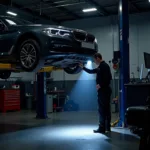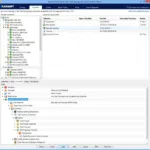A diagnostic check is an essential part of modern car repair. By understanding what a diagnostic check entails and its benefits, car owners can make informed decisions about their vehicle maintenance and save money in the long run.
What is a Diagnostic Check Car Repair?
A diagnostic check, often referred to as car diagnostic testing, is a process where a technician uses a specialized tool, a car diagnostic scanner, to communicate with your car’s computer system. This system, also known as the Engine Control Unit (ECU), monitors various aspects of your car’s performance. The scanner retrieves Diagnostic Trouble Codes (DTCs), which are essentially error codes stored in the ECU. These codes act like clues, pointing the mechanic towards the root of the problem.
For instance, if your check engine light is on, a diagnostic check can quickly pinpoint if it’s a minor issue like a loose gas cap or a more serious problem with the engine.
Benefits of Diagnostic Checks
Diagnostic checks offer numerous benefits for car owners:
- Early Detection: Identifying issues early prevents minor problems from escalating into major, costly repairs.
- Accurate Diagnosis: Diagnostic checks provide precise information, eliminating guesswork and unnecessary repairs.
- Cost Savings: By accurately identifying the problem, you only pay for the necessary repairs, saving you money on unnecessary parts and labor.
- Improved Performance: Addressing issues detected through diagnostics can enhance fuel efficiency, engine performance, and overall vehicle reliability.
Understanding Diagnostic Trouble Codes (DTCs)
DTCs are alphanumeric codes that correspond to specific vehicle malfunctions. They are categorized into four groups:
- P Codes: Related to the powertrain, including engine and transmission.
- B Codes: Related to the body, including airbags, power windows, and central locking.
- C Codes: Related to the chassis, including ABS, traction control, and electronic suspension.
- U Codes: Related to network and communication issues between modules.
When to Get a Diagnostic Check?
While regular maintenance is recommended, there are specific situations when a diagnostic check is crucial:
- Warning Lights: If any dashboard warning lights, like the check engine light, illuminate, it’s crucial to get a diagnostic check.
- Performance Issues: Experiencing problems such as rough idling, misfiring, stalling, or reduced fuel efficiency warrants a diagnostic check.
- Post-Accident: After an accident, a diagnostic check can reveal hidden damages.
- Used Car Purchase: Before buying a used car, a diagnostic check provides insights into the vehicle’s condition and potential issues.
DIY vs. Professional Diagnostic Checks
While some car owners may be tempted to use DIY code readers, professional diagnostic checks are highly recommended.
DIY Code Readers:
- Limited Functionality: Basic code readers might only display the DTC without providing detailed information or potential causes.
- Misinterpretation: Without proper knowledge, interpreting DTCs and identifying the root cause can be challenging.
- Missed Issues: DIY scanners might not detect all issues or provide the depth of analysis that professional equipment offers.
Professional Diagnostic Checks:
- Advanced Equipment: Professional garages use high-end scanners that provide comprehensive data and analysis.
- Experienced Technicians: Qualified mechanics have the expertise to interpret DTCs, pinpoint the root cause, and recommend appropriate repairs.
- Comprehensive Inspection: Often, a professional diagnostic check is part of a broader vehicle inspection, ensuring other potential issues are addressed.
Finding a Reliable Diagnostic Check Service
When looking for a reliable diagnostic check service, consider these factors:
- Reputation: Choose a reputable garage with experienced technicians.
- Equipment: Ensure the garage uses up-to-date diagnostic equipment.
- Transparency: Opt for a service that clearly explains the findings and provides a detailed report.
- Fair Pricing: Inquire about the cost of the diagnostic check and compare quotes from different garages.
Conclusion
A diagnostic check is a vital part of modern car repair, offering early detection, accurate diagnosis, and potential cost savings. While DIY options exist, professional diagnostic checks are recommended for their comprehensive analysis and expert interpretation. By understanding the importance of diagnostic checks and choosing a reliable service provider, car owners can maintain their vehicles effectively and ensure optimal performance.
FAQ
1. How much does a diagnostic check cost?
The cost can vary depending on the garage and the complexity of the issue. It’s best to contact local garages for quotes.
2. Can a diagnostic check drain my car battery?
No, a diagnostic check uses minimal power and shouldn’t drain your car battery.
3. Will a diagnostic check reset my check engine light?
Yes, after addressing the issue identified by the diagnostic check, the mechanic will reset the check engine light.
4. Can I drive my car with the check engine light on?
While it might be possible to drive for a short period, it’s crucial to get a diagnostic check as soon as possible to avoid potential damage or safety risks.
5. Are diagnostic checks covered under warranty?
Some warranties might cover diagnostic checks, especially if they are related to a covered repair. Check your warranty terms or contact your dealer for clarification.
6. What is a mobile car diagnostics basingstoke?
Mobile car diagnostics in Basingstoke is a service where a qualified technician comes to your location to perform the diagnostic check, offering convenience and flexibility.
7. How often should I get a car diagnostic basingstoke?
It’s recommended to get a diagnostic check annually or as part of your regular car maintenance schedule. However, if you notice any warning lights or performance issues, get a check immediately.
Common Diagnostic Check Scenarios
Here are some common scenarios where a diagnostic check is necessary:
- Scenario 1: Your check engine light is on, and you notice a decrease in fuel efficiency.
- Scenario 2: Your car is idling rough, and you feel vibrations in the steering wheel.
- Scenario 3: Your ABS warning light is on, and you feel a pulsing sensation when braking.
Need Help? Contact Us!
If you have any questions or need assistance with your car’s diagnostics, don’t hesitate to contact us. Our team of experts is here to help. You can reach us through WhatsApp at +1(641)206-8880 or email us at [email protected]. We provide 24/7 customer support for all your car diagnostic needs.


